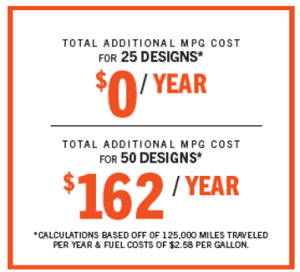Alan Ritchey Inc. Testimonial
“One of our concerns when we first started testing the Ex-Guard product was the idea that the guards might adversely affect our MPG. We are very sensitive to this issue, and we go to great lengths to spec and maintain our trucks for maximum MPG. After a thorough analysis of several test units, we could find no measurable MPG difference between the trucks that had the Ex-Guard on them and the identical trucks that did not have the guards installed. This made the return on investment time for the Ex-Guard even shorter.
We look forward to using the guards on all of our future trucks and thank you for a well made, easy to install and use product that has positively impacted our company.”
-Dave Allison | Senior Vice President | Alan Ritchey, Inc. | Valley View, TX
Hit Moose at 105km/hr with Ex-Guard!
“Hit a full grown cow moose dead centre last night at 105kmhr. Saved me and my truck. Just rolled the mount brackets some. I travel thousands of km every year on back roads repairing forestry equipment in northern Alberta. Best guard I’ve seen and a super good investment. Thanks Ex-Guard!”
– Richard Bourgeois | Richy B Contracting Ltd
See details on this Featured XG-150
FUEL ECONOMY TESTING
MESILLA VALLEY TRANSPORTATION SOLUTIONS
Validates Ex-Guard’s Performance
Las Cruces, New Mexico – May 15, 2019 – MVT Solutions, a provider of breakthrough fuel economy testing and design and development services for the trucking industry, today announced that its evaluation of the Ex-Guard LT series grille guards, manufactured by Ex-Guard Industries, provides front end damage protection to trucks which have little to no negative impact on the trucks overall fuel efficiency.
“Our testing found the Ex-Guard LT-325 grille guard had no discernable effect on fuel economy while the LT-350 had only a small negative impact of -0.51%, which is a smaller impact than the tractor’s side mirrors,” stated Daryl Bear, lead engineer & COO at MVT Solutions.
“The results are what we expected based on feedback from fleets that already use our product, but we asked MVT Solutions to quantify the fuel consumption impact of our grille guards in an attempt to completely alleviate any concerns about MPG loss with our guards,”
Dennis Geipel, a representative from Ex-Guard added. “We chose MVT Solutions for these trials because of their reputation in fuel economy testing and wanted to eliminate any questionable variables that might have remained. These verified results will now allow fleets to make a well-informed decision about adding Ex-Guard grille guards based on their ability to prevent costly front-end damage.”
The certified testing by MVT Solutions was developed from race car engineering and advanced vehicle test methods using sensors and recording systems that collect data on fuel consumption, aerodynamics, rolling resistance, driver behavior and other variables that affect fuel consumption. The data is analyzed using MVTS proprietary methods.
For the Ex-Guard evaluations, two test vehicles ran simultaneously at 65 MPH on a 9-mile circle track. The 2019 International LT models were specified with Cummins X15 engines and Eaton 10-speed automated manual transmissions. The tractors pulled 53-ft Hyundai dry vans equipped with Michelin Energy Guard aerodynamic systems, and both tractors and trailers were fitted with single wide-base tires.
“Typically, interfering with the airflow on a vehicle can impact fuel economy significantly,” said Daryl Bear. “However, Ex-Guard products minimize their affect on aerodynamic drag because they are mounted several inches away from the front of the vehicle and are designed with round tubing, allowing air to continue flowing. Ex-Guard grille guards are not a fuel saving product, but our testing should provide fleets with the confidence to consider their use based on maintenance and operational costs as opposed to fuel economy losses.”
Calculating Total Savings or Cost with Ex-Guard
MVTS Transport conducted Third Party Real Life Testing with Ex-Guards.
The following are the results of that test.
25 Designs
No effect on fuel economy, therefore zero cost in fuel.
50 Designs
At 125,000 miles traveled annually, the fuel used would be 66 gallons, .5GAL/1000 miles.
FINANCIAL IMPACT CALCULATION
-66 gallons/year x $2.58/gal = $162/yr fuel cost
Using the average retail cost of diesel fuel in the U.S. in 2020 at $2.58 /gal, this amounts to $162 annually in fuel per truck.


